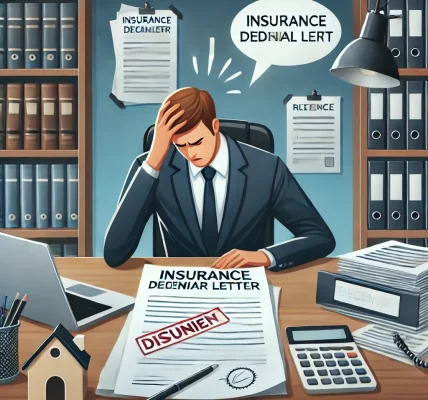Filing an insurance claim may seem straightforward, but even small mistakes can lead to delays, underpayments, or outright denials. Many policyholders make errors simply because they are unfamiliar with the claims process. To help you avoid these pitfalls, this step-by-step DIY guide will walk you through the most common mistakes and how to prevent them, ensuring a smoother and more successful insurance claim experience.
1. Not Understanding Your Insurance Policy
Mistake:
Many policyholders file claims without fully understanding their policy’s terms, exclusions, deductibles, and limits. This can lead to unexpected denials or lower payouts.
How to Avoid It:
- Carefully read your policy document and clarify any doubts with your insurer.
- Know what is covered, your deductible, and any exclusions.
- Keep a copy of your policy handy for reference when filing a claim.
2. Delaying the Claim Process
Mistake:
Waiting too long to file a claim can lead to rejection, as most insurance companies have strict time limits.
How to Avoid It:
- File your claim as soon as possible after the incident occurs.
- Notify your insurer immediately and follow their instructions.
- Keep track of deadlines for submitting documentation.
3. Failing to Provide Proper Documentation
Mistake:
Insufficient or inaccurate documentation can delay the processing of your claim or lead to a denial.
How to Avoid It:
- Take clear photographs and videos of the damage or loss.
- Keep receipts, invoices, and any related financial records.
- Obtain police reports if applicable (e.g., for theft or accidents).
- Document everything in writing, including conversations with the insurer.
4. Providing Inaccurate or Incomplete Information
Mistake:
Even minor inaccuracies in your claim form can lead to complications or rejections.
How to Avoid It:
- Double-check all details before submitting your claim.
- Be honest and transparent in your reporting.
- Avoid exaggerating or misrepresenting damages, as this can be considered fraud.
5. Not Cooperating with the Insurance Adjuster
Mistake:
Being unresponsive or uncooperative with the insurance adjuster can slow down the claims process.
How to Avoid It:
- Be available for inspections and provide requested documents promptly.
- Maintain open communication and ask questions if you don’t understand something.
- Keep records of all interactions with the adjuster for future reference.
6. Accepting the First Settlement Offer Without Review
Mistake:
Many policyholders accept the first settlement offer without verifying whether it covers the full extent of their damages.
How to Avoid It:
- Review the offer carefully and compare it with your estimated costs.
- Seek professional advice if you are unsure whether the settlement is fair.
- If needed, negotiate with your insurer for a better settlement.
7. Failing to Appeal a Denied Claim
Mistake:
Assuming that a denied claim is final and not taking further action.
How to Avoid It:
- Review the denial letter carefully to understand the reason for rejection.
- Gather additional evidence and resubmit the claim with a well-documented appeal.
- Seek legal or professional assistance if necessary.
8. Ignoring Policy Exclusions and Conditions
Mistake:
Filing a claim for an incident that is explicitly excluded from your policy can waste time and effort.
How to Avoid It:
- Review the exclusions section of your policy before filing a claim.
- If unsure, consult your insurer or an expert to confirm eligibility.
9. Not Keeping a Personal Record of All Transactions
Mistake:
Relying solely on the insurance company’s records can lead to disputes if there are discrepancies.
How to Avoid It:
- Keep copies of all correspondence, including emails, letters, and claim forms.
- Maintain a personal log of phone conversations, noting dates, times, and key details.
10. Overlooking Additional Coverage Benefits
Mistake:
Some policyholders miss out on additional benefits such as rental car coverage, temporary housing, or medical reimbursements.
How to Avoid It:
- Ask your insurer about any additional benefits you may be entitled to.
- Check if your policy includes coverage for extra expenses related to your claim.
11. Settling a Claim Without Legal or Professional Advice (If Needed)
Mistake:
In complex cases, settling without expert advice can lead to financial loss.
How to Avoid It:
- If your claim involves significant amounts or disputes, seek legal or professional assistance.
- Consider hiring a public adjuster to assess the damage and negotiate on your behalf.
12. Filing Multiple Claims for Minor Issues
Mistake:
Submitting multiple small claims can lead to increased premiums or policy cancellation.
How to Avoid It:
- Consider paying out-of-pocket for minor damages instead of filing a claim.
- Reserve claims for significant losses that justify the deductible and potential premium increases.
Conclusion
Filing an insurance claim correctly requires attention to detail, prompt action, and clear communication. By avoiding these common mistakes, you can increase the likelihood of a successful claim while minimizing stress and delays. Always review your policy, document everything, and don’t hesitate to seek professional help when necessary.
Being proactive and informed will empower you to navigate the claims process smoothly and ensure that you receive the compensation you deserve.



